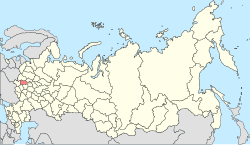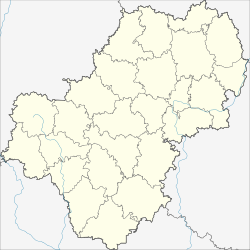Kaluga
| Kaluga (English) Калуга (Russian) |
|
|---|---|
| - City - | |
 |
|
 Location of Kaluga Oblast in Russia |
|
|
|
|
|
|
|
|
|
|
| City Day | Second Saturday of September |
| Administrative status (as of October 2011) | |
| Country | Russia |
| Federal subject | Kaluga Oblast |
| Administratively subordinated to | City of Kaluga |
| Administrative center of | Kaluga Oblast, City of Kaluga |
| Municipal status (as of October 2012) | |
| Urban okrug | Kaluga Urban Okrug |
| Administrative center of | Kaluga Urban Okrug |
| City Head | Konstantin Gorobtsov |
| Representative body | City Duma |
| Statistics | |
| Area | 170.5 km2 (65.8 sq mi) |
| Population (2010 Census) | 324,698 inhabitants |
| - Rank in 2010 | 55th |
| Density | 1,904/km2 (4,930/sq mi) |
| Time zone | MSK (UTC+03:00) |
| First mentioned | 1371 |
| Postal code(s) | 248xxx |
| Dialing code(s) | +7 4842 |
|
|
|
| on | |
Kaluga (Russian: Калуга; IPA: [kɐˈluɡə]) is a city and the administrative center of Kaluga Oblast, Russia, located on the Oka River 150 kilometers (93 mi) southwest of Moscow. Population: 324,698 (2010 Census);334,751 (2002 Census);311,319 (1989 Census).
Kaluga, founded in the mid-14th century as a border fortress on the southwestern borders of the Grand Duchy of Moscow, first appears in the historical record in chronicles in the 14th century as Koluga; the name comes from Old Russian kaluga - "bog, quagmire". In the Middle Ages Kaluga was a minor settlement owned by the Princes Vorotynsky. The ancestral home of these princes lies southwest of the modern city.
On 19 January 1777 the Kaluga drama theatre opened its first theatrical season, established with the direct participation of the Governor-General M. N. Krechetnikov.
Kaluga is connected to Moscow by a railway line and by the ancient roadway, the Kaluga Road (now partly within Moscow (as Starokaluzhskoye Shosse - the Old Kaluga Highway), partly the A101 road). This road offered Napoleon his favored escape route from the Moscow trap in the fall of 1812. But General Kutuzov repelled Napoleon's advances in this direction and forced the retreating French army onto the old Smolensk road, previously devastated by the French during their invasion of Russia.
...
Wikipedia



